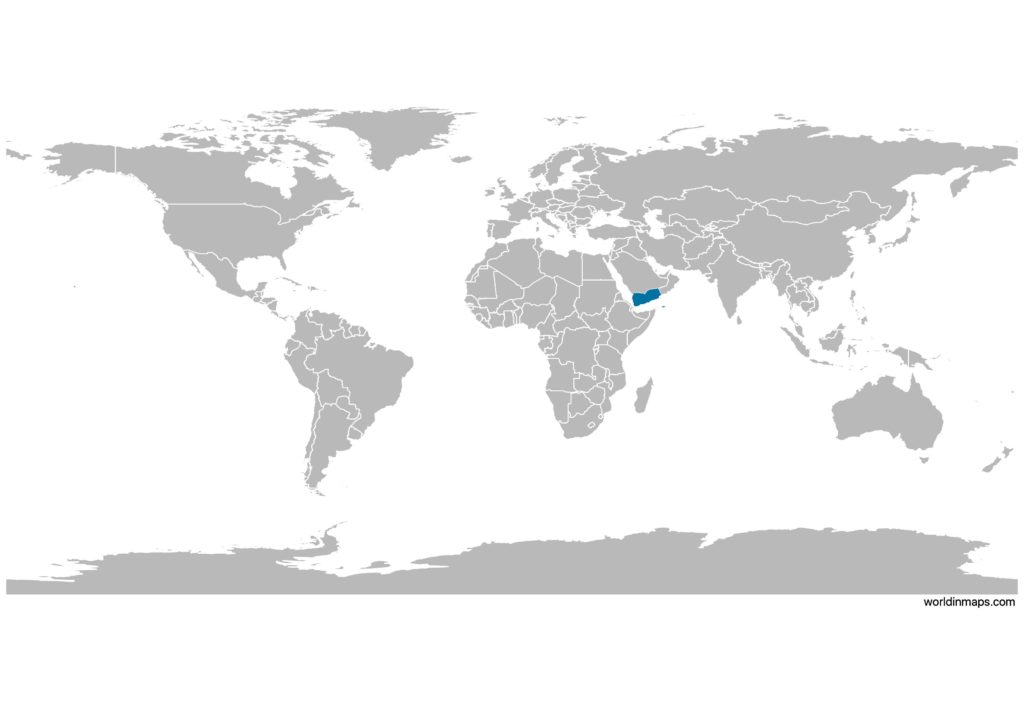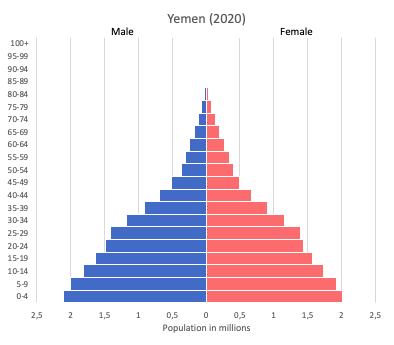Yemen

| Government | |
| Name | Republic of Yemen |
| Arabic | اَلْجُمْهُورِيَّةُ ٱلْيَمَنِيَّةُ al-Jumhūrīyah al-Yamanīyah |
| Government type | in transition |
| Capital | Sanaa (1,707,531 (2004)) |
| Currency | Yemeni rial (YER) |
| People | |
| Population (2020) | 29,825,968 (48th) |
| Density of population | 44.7 P/km2 (160th) |
| Nationality | Yemeni |
| Official languages | |
| Arabic | |
| Ethnic groups | |
| Arab | 92.8% |
| Somalis | 3.7% |
| Afro-Arab | 1.1% |
| Indian-Pakistani | 1% |
| Other | 1.4% |
| Religions (2010) | |
| Muslim (official) | 99.1% |
| Sunni | 65% |
| Shia | 35% |
| other | 0.9% |
| Life expectancy (2020) | |
| Male | 64.7 years |
| Female | 69.3 years |
| Total population | 66.9 years (183rd) |
| Homicides | |
| Total (2013) | 6.8 per 100,000 people (47th) |
| Geography | |
| Land area | 527,968 km2 |
| water area | 0 km2 |
| total area | 527,968 km2 (51st) |
| Mean elevation | 999 m |
| Lowest point | |
| Arabian Sea | 0 m |
| Highest point | |
| Jabal an Nabi Shu’ayb | 3,666 m |
| Land use (2011) | |
| Agricultural land | 44.5% |
| Arable land | 2.2% |
| Permanent crops | 0.6% |
| Permanent pasture | 41.7% |
| Forest | 1% |
| Other | 54.5% |
| Urbanization | |
| Urban population (2020) | 37.9% |
| Rate of urbanization | 4.06% annual rate of change (2015 – 2020) |
| Economy | |
| Labor force (2017) | 7.425 million (65th) |
| Labor force by occupation | |
| Agriculture | > 75% |
| Industry and services | < 25% |
| Unemployment rate (2014) | 27% (198th) |
| GDP (PPP) (estimate 2018) | |
| Total | $73.348 billion (118th) |
| Per capita | $2,380 (161st) |
| GDP (nominal) (estimate 2018) | |
| Total | $28.524 billion (103rd) |
| Per capita | $925 (177th) |
| GDP by sector (estimate 2017) | |
| Agriculture | 20.3% |
| Industry | 11.8% |
| Services | 67.9% |
| Exports (2017) | $384.5 million (183rd) |
| Exports partners (2017) | |
| Egypt | 29.4% |
| Thailand | 16.7% |
| Belarus | 13.5% |
| Oman | 10.5% |
| UAE | 6.5% |
| Saudi Arabia | 5% |
| Imports (2017) | $4.079 billion (139th) |
| Imports partners (2017) | |
| UAE | 12.2% |
| China | 12.1% |
| Turkey | 8.7% |
| Brazil | 7.3% |
| Saudi Arabia | 6.5% |
| Argentina | 5.5% |
| India | 4.7% |
Yemen on the world map

Yemen is located in Asia and more specifically in the Middle East.
Yemen top 10 largest cities (2004)
- Sanaa (1,707,531)
- Aden (588,938)
- Taiz (466,968)
- Al Hudaydah (409,994)
- Ibb (212,992)
- Mukalla (182,478)
- Dhamar (146,346)
- Amran (77,825)
- Bajil (55,760)
- Sadah (51,870)
Demography
Population pyramid

Age structure data
Estimate for 2020:
- 0-14 years: 39.16% (male 5,711,709 /female 5,513,526)
- 15-24 years: 21.26% (male 3,089,817 /female 3,005,693)
- 25-54 years: 32.78% (male 4,805,059 /female 4,591,811)
- 55-64 years: 4% (male 523,769 /female 623,100)
- 65 years and over: 2.8% (male 366,891 /female 435,855)
Remark: the age structure of a population affects a nation’s key socioeconomic issues. Countries with young populations (high percentage under age 15) need to invest more in schools, while countries with older populations (high percentage ages 65 and over) need to invest more in the health sector. The age structure can also be used to help predict potential political issues. For example, the rapid growth of a young adult population unable to find employment can lead to unrest.
Population from 1950 to 2020
Source: United Nations, Department of Economic and Social Affairs, Population Division (2019). World Population Prospects 2019, Online Edition. Rev. 1.
Evolution of the life expectancy from 1960 to 2018
Source: World Development Indicators, The World Bank
Economy
Agriculture:
grain, fruits, vegetables, pulses, qat, coffee, cotton, dairy products, livestock (sheep, goats, cattle, camels), poultry, fish
Industries:
crude oil production and petroleum refining, small-scale production of cotton textiles, leather goods, food processing, handicrafts, aluminum products, cement, commercial ship repair, natural gas production
Exports – commodities:
crude oil, coffee, dried and salted fish, liquefied natural gas
Imports – commodities:
food and live animals, machinery and equipment, chemicals
Time zone and current time in Yemen
Go to our interactive map to get the current time in Yemen